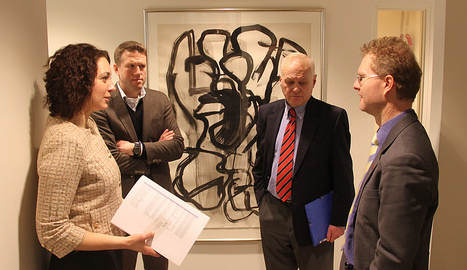PST
Norway MP warned for Russian spy contacts
Norway’s Police Security Service (PST) has warned an MP from the populist Progress Party about his excessive social contact with suspected Russian intelligence officers, Norway’s VG newspaper has reported in an investigative article.
Published: 24 June 2015 10:27 CEST

Progress MP Tor André Johnsen (right) talking to Semyon Dzakhaev (second right), the Russian diplomat who is Deputy Director General of the OSCE. Photo: OSCE Parliamentary Assembly.
PST officers last year demanded a face-to-face meeting with Tor André Johnsen in the Norwegian Parliament, in which they demanded that he only meet the Russian embassy officials publicly in parliament, and not in his free time in restaurants and clubs.
The VG article also details how Johnsen, who speaks Russian and lived in Moscow for nearly a year in 1998, lobbied his MP colleagues in Norway’s delegation to the OSCE to back a controversial Russian security proposal, which he then went on to become one of only two MPs in Europe to sign.
According to VG, Johnsen has during two separate meetings with PST agents disagreed with their analysis of the risks posed by his meetings with Russian embassy officials, telling them that he did not intend to follow their advice.
Tor André Johnsen, who lives in Brumunddal, told VG that he had maintained a strong interest in Russia ever since watching the Russian delegation at the Lillehammer Olympics 22 years ago.
Johnsen responded on Tuesday with an article in Norway's Aftenposten newspaper.
“VG is trying today to create an impression that I do not listen to PST, and that I have irregular contact with Russia,” he wrote. “These are very serious accusations that are not correct.”
“I have worked with and in Russia for 17 years and my wife is Ukrainian. She was born in Ukraine and my daughter’s grandmother still lives there,” he said earlier. “I have a different relationship with Russia and Ukraine than many others in Norway.”
He explained that he had moved to Moscow in 1998 to start a representative office for Norska Skog, the Norwegian forestry company, which is the world’s second largest producer of newsprint, staying there for almost a year.
According to VG, Johnsen lobbied last year to convince Norway’s delegation to the OSCE to back a controversial Russian proposal on European security policy.
At a meeting in Norway’s parliament on June 12, just months after Russia’s annexation of Crimea, Johnsen tried to convince his colleagues to back an OSCE security proposal backed by Nikolaj Kovalev, the Russian delegation member in the OSCE.
“Johnsen was positive to the resolution, but we were very clear to him that this was problematic and would send the wrong signal,” Torstein Tvedt Solberg, an MP from the Labour Party and OSCE delegate, told VG. “The resolution had to be read in the context that Russia had just annexed part of another European country.”
Conservative MP Trond Helleland was also against any Norwegian MP backing the resolution.
“Although the resolution itself looked innocent, I suspected that if they got a Western signature on a resolution that the Russians were behind it, that they would then use it in their propaganda,” the
Johnsen, however, continued lobbying for the proposal, and ended up signing it anyway, despite the opposition of his parliamentary colleagues. The only other European MP to sign the proposal was a member of the Independent Greeks, a hard-right Eurosceptic party.
Andrej Kovalev, the proposal’s sponsor, was Vladimir Putin’s predecessor as head of Russia’s FSB intelligence service, leaving the job in 1998.
The controversy over Johnsen’s close relationships with Russian diplomats deemed to be intelligence officials comes after Germany’s Bild newspaper last year detailed Russian plans to fund and influence Europe’s hard-right populist parties, presumably to weaken the European Union.
According to VG, Johnsen’s backing for the Russian position on Ukraine has been an embarrassment for Norway, drawing complaints from OSCE delegates from Baltic states such as Lithuania.
At the OSCE conference in Baku last June, Johnsen met with Russian delegates, despite a clear sense among other Norwegian MPs at the conference that the recent annexation of Crimea meant that they should refrain from friendly contact.
“Johnsen was very active among the Russian delegation to the OSCE,” said Torstein Tvedt Solberg, a Labour party MP and OSCE delegate. “He talked with them both inside and outside the meeting rooms. As he speaks Russian, unlike everyone else in the delegation, I have no idea of what they were talking about.”
Arne Christian Haugstøyl, a Section head at PST, said that he had repeatedly warned Norwegian MPs against excessive contact with Russian diplomatic officials, warning that even social contact may be risky.
“The Russian embassy has a fairly formidable number of intelligence officers under diplomatic cover,” he said. “These are highly trained personnel who will manage to build up trust and a friendly relationship. Then you become more vulnerable to being exploited to provide more information than you had intended.”
He cited examples from the past where a Russian agent who had previously seemed friendly began blackmailing a Western contacts.
“You can be put in situations where you can be put under pressure. We have examples where people have received film tickets in a brown envelope, but where the look is far more serious when the picture is taken.”
Url copied to clipboard!


 Please whitelist us to continue reading.
Please whitelist us to continue reading.
Member comments